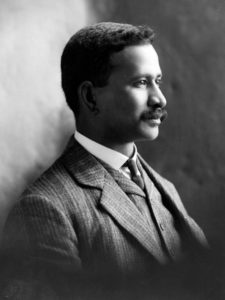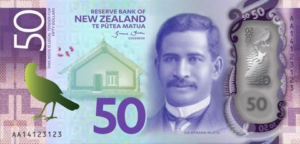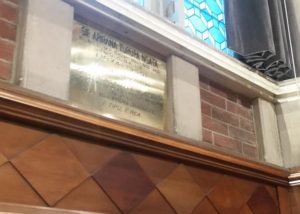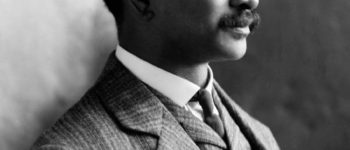1892: The Past and Future of the Maori
December 15, 2020
By AHNZ
 The prize essay at Canterbury College¹ in 1892 was awarded to a young Maori political studies undergraduate named Apirana Ngata. Only 18, this was a long time before Ngata joined the National Party or gave his Price of Citizenship speech, or appeared on the fifty dollar note.
The prize essay at Canterbury College¹ in 1892 was awarded to a young Maori political studies undergraduate named Apirana Ngata. Only 18, this was a long time before Ngata joined the National Party or gave his Price of Citizenship speech, or appeared on the fifty dollar note.
Ngata would return to Canterbury to help it celebrate its 50th Jubilee Anniversary in 1900². Local and visiting Maoris set up and lived in their own camp in Hagley Park where they contributed performances and food for paying audiences. It was probably the most Maoris Christchurch had seen for hundreds of years.
 The essay had a few interesting observations worth remarking on. Especially since they come from a learned man from the Maori world.
The essay had a few interesting observations worth remarking on. Especially since they come from a learned man from the Maori world.
“Your Maori of to-day is but the savage of yesterday, polished and draped in English finery. Within him there are raging the fierce passions that but a while ago made him revel in slaughter and cannibalism. His hands are bound with the manacles of civilisation and humanity, but they are restless to grasp once more the spear, the taiaha, and mere. Outwardly he accepts the truth of Christian teaching, and worships the pakeha’s god most reverently, but his mind is governed by superstition”
Exciting attention-grab for a man trying to win an essay competition. The reader gets a thrill to think he is reading the confessions of a repressed savage! Beyond that, I’m sceptical he really meant any of this. 1890s Maori were a fairly docile lot.
“Still there are traces, if not of aborigines, at least of a race who lived here before the Maoris came. The Urewera tribe and the tribes of Taupo and the Lake District are distinguished from the rest by their features, which approach more nearly the negro type, and by a slight difference in dialect. Moreover, they worship a deity called the Pou-a-Tuatioi, peculiar to themselves….The Ureweras are far less refined and less intelligent than their neighbours…They show greater reluctance, to conform to European habits, and to admit the principles of Christianity.”
Even today the Urewera Maoris stand out but I don’t have any IQ data in their population to refer to.
“The influence of an earlier Tohunga system is most apparent in these and such like traditions. The prevailing tone is that of superstitious awe, of an expression of the desire to invoke the aid of the gods or to propitiate them.”
This is characteristic of the primitive mind, to perceive problems as being personal and to solve problems with concrete thinking. Not to look to abstract causes or the laws of nature and take responsibility but to appeal to an alpha being beyond and solicit its help.
“It was not every pakeha that had Captain Cook’s knack of treating with the natives. Had a few more Captain Cooks undertaken the work of settlement and opened up intercourse with the natives and brought them Into communication with the outer world, the troubles and conflicts that make up the sum of early New Zealand history might have been avoided.”
It’s an agreeable change to hear complimentary Maori words about Captain Cook which is how everyone spoke of him until a generation or two ago. Now, Cook’s reputation is very much under attack (ref. 1769: Cook’s Arrival in New Zealand Was a Disaster?)
 “There is the faintest hope that the Maori as a race will not die out.”
“There is the faintest hope that the Maori as a race will not die out.”
Here Ngata speaks of a race that has died out. When we talk about Maori today we don’t refer to them, they are gone. We mean people who look a bit Maori or identify as Maori. They are part-Maori, biologically speaking. It’s a bit like how nobody died of the flu in 2020 because we called it something different: COVID-19. In the same way, we could reduce all road fatalities in this country to zero by re-naming it ‘automorbidity’. Then the statistics would look fantastic. However, there would also be a huge leap in automorbidity…
“With the more complete settlement of the land by the pakeha, there is every likelihood that the Maori, being confined to smaller and more workable areas, and having agricultural improvements around him, will be induced, if not compelled, to apply himself to agriculture and industry.”
This really puts a positive spin on Maori losing their land and being surrounded by a colonising culture. I think this Maori is really sincere too but if a modern Macron Maori (Māori) read this they’d be incensed.
“Those who are sanguine that the race will not die out feel hope grow stronger when they find that already, in different parts of the colony, the natives are beginning to appreciate the benefits of agriculture.”
Agriculture was indeed discovered and these people did live a rural agricultural life right up to the Second Great Migration in the 1960s. Going back to pre-Colonial and pre-Musket War times, Maori did practise agriculture but that was a generations ago. They grew crops for the whalers and before that, for themselves. By 1892 they’re a bit out of practise.
“The introduction of fire-arms raised the banner of destruction, and for twenty years great war* worked havoc amongst the male population.”
Curious that Ngata says ‘male population’, I’d never considered this. In the wake of the Musket Wars were there a surplus of women? Then, the victors must have had many female slaves and wives and that must have made some notable impacts upon post-1830s Maori society. A surplus and so devaluation of woman, and all that implies including a hyper-competitiveness among them.
“…the evils of the influence of tohungas, of the institution of what are called “tangis” or burials of the dead…the tohungas..are the men who, by acting upon the feelings of a superstitious people…terrifying their victims with incantations…These men attempt to stay an epidemic by depriving it of its prey, by murdering the inhabitants of a district, that the dreaded evil might be passed over as soon as possible: then they would boast of the number they had rescued from the jaws of death; they are dumb when asked how many they have murdered or spirited away.”
Despite men like James Pope telling Maori of the dangers of infection Maori Hygiene Culture was still light years behind that of the Victorians. The body of the dead would lay for days, rotting, while attended by friends and extended family. This was so even if the death were due to a communicable disease such as small pox. The Maoris didn’t understand what we do about infection or how to treat it. Their medical professionals, tohungas, apparently resorted to purging entire populations to deprive the evil spirits/infections of a host body. A murderous and blunt instrument for the collective good with no regard for individual rights.
“By educating the Maori you generally render him unfit to take part in the struggle for life in which his race is engaged. You render him versatile, pliant and yielding under the influence of an English mind, conceited and over-bearing towards his own people.”
“…they view with supreme contempt the shortcomings of the one in such matters as dress, food, and dwelling, and survey with defective eyesight only the more prominent, the more fascinating and the more easily acquired customs and occupations of the other. And amongst the combating influences of education and heredity, tawdry fascination and conceit they are lowered in sight of all till they reach a point where they become truly loathsome, contemptible, degraded and despicable: and in their fall they drag down with them the remnants of their race and the last hopes of their English sympathizers.”
 What a nightmare scenario! I would refine this observation not to pin the blame on education per se. The trouble is not that these educated Maoris have been cursed with knowledge and that ignorance is bliss. The trouble is they have not learned what to do with learning, not been educated as to what to do with education.
What a nightmare scenario! I would refine this observation not to pin the blame on education per se. The trouble is not that these educated Maoris have been cursed with knowledge and that ignorance is bliss. The trouble is they have not learned what to do with learning, not been educated as to what to do with education.
Ngata had to solve that problem, as did several excellent men of his generation. Maybe that’s why Ngata took a second degree up in Auckland after Canterbury College? Academic procrastination? This theme is explored very enjoyably by Will Smith in Hancock (2008.) A black man bestowed with supreme powers above his fellows turns away from his potential to be heroic, instead he is a drunken bum- “loathsome, contemptible, degraded and despicable.” Like the little girl in How the Grinch Stole Christmas, there is one person left who doesn’t hate Hancock and wants to help him be better if he chooses so.
This raises the question: Who was Ngata’s life coach? What’s his Hancock character ark?
“The Maori as a race must lose his purity and ultimately must be extinguished.”
That escalated quickly. A moment ago there was a faintest hope. Oh well, guess you’d better donate to Logan Campbell’s One Tree Hill monument then by way of farewell.
“…death gaining the day, warriors weltering in their blood, leaders stricken in the bloom of manhood, yet gladly dying with the knowledge that though their race is lost, it has died hard, bravely and nobly.”
That is to say, if you must die then die with your boots on. Go down swinging and live forever. This is a sentiment that would unite both the Maoris and the Victorian essay markers of 1892.
—
1 Canterbury Colledge had been gobbled up at this point by the University of New Zealand
2 15th-21st December, 1900
Ref. The Past and Future of the Maori; Parts 1 and 2, The Press (December 1892); Papers Past
Image ref. Ngata, NZ Law Society
Image ref. Ngata’s plaque in Great Hall, old Canterbury College campus; AHNZ Archive (2020)
5 thoughts on "1892: The Past and Future of the Maori"
Leave a Reply
 Like Comment Share
Like Comment Share






Utterly fascinated by this essay. I’ve printed it out to digest more thoroughly. Bit of a puritan wasn’t he? I recall he imposed prohibition upon the East Coast Maori who I think were rather angry and created a haka by way of response.
I’m very glad to be the one to raise this essay up and dust it off. Please let me know if you have any insights or observations I’ve missed.
Don’t think he was puritanical so much as dignified and disciplined. Puritanism belongs to Victimhood Culture. You can see the roots of that behaviour in this youthful outlook about what corrupts the native.
‘A surplus of women’. Answer is no, there wasn’t. Female children were slaughtered during the musket wars because they were extra mouths to feed. Slave mothers would kill their children to prevent them suffering the same fate. Lack of breeding stock was the reason the Maori population continued to decline from the end of the musket wars in 1847 until 1901 when the population started to recover. (Census 1857 57,000 Maori. 1901 43,000.) Mostly by interbreeding with europeans, because by 1900 Maori were functionally extinct as a race. The revisionists of course will have us believe that it was disease and the insurrections of 1860-1878 that were the cause of the decline. The answer of course is that maori had been exposed to European diseases since 1769 …so by the 1860s were largely immune. The insurrections killed about 2300 maori compared to the 60,000 of the musket wars…so that holds little substance as well.
Thanks for that. I would like to find more evidence of this femicide. If so it’s an important fact that State History will not teach.
Don, In his essay Apirana laments the interbreeding with, “…low, vulgar, uneducated, degenerate pakeha…” and the loss of racial purity among Maori.